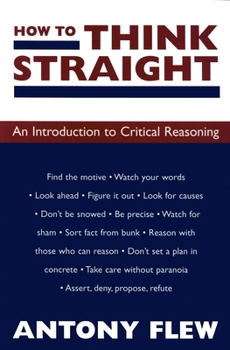How to Think Straight: An Introduction to Critical Reasoning
Select Format
Select Condition 
Book Overview
Practical reasoning and clear thinking are essential for everyone if we are to make sense of the information we receive each day. Being able to quickly know the difference between valid and invalid arguments, the contradictory versus the contrary, vagueness and ambiguity, contradiction and self-contradiction, the truthful and the fallacious, separates clear thinkers from the crowd.How to Think Straight lays the foundation for critical reasoning by...
Format:Paperback
Language:English
ISBN:1573922390
ISBN13:9781573922395
Release Date:October 1998
Publisher:Prometheus Books
Length:168 Pages
Weight:0.60 lbs.
Dimensions:0.5" x 6.3" x 8.8"
Customer Reviews
4 ratings
For those interested in accuracy, validity, and truth
Published by Thriftbooks.com User , 14 years ago
While the elderly Antony Flew has been hijacked by disingenuous evangelicals to serve their propagandist needs of late, people of reason shouldn't let that diminish his other work. This book serves as a great example. Written as a concise guide to critical thinking (something those evangelicals should study) this book is a treasure of clear thinking. Anyone with even a passing familiarity and aptitude for logical thought and rational discourse can recognize that the current public forum inhabited by the Sean Hannitys, Glenn Becks, and Rush Limbaughs - where so many inept and invalid arguments spew forth - will welcome this book as a draught of clarity. And in fairness, the liberal side, while less pronounced, has similar problems at times; it's just that the conservative pundits make the most and readily visible gaffes in their crusade to pander to the lowest common denominator. Flew drives the point home convincingly that everyone and anyone is liable to make errors in reasoning and argument. From the first page the author expels the sadly all too common misunderstandings concerning truth and validity. Simply put, as Flew does in the second paragraph: "What is true, or false, is propositions. What is valid, or invalid, is arguments." Put another way, one may reach a false conclusion with a valid argument or a true conclusion with invalid reasoning. Comprehending these basic distinctions is the duty of anyone who desires integrity in their communication. Expounding on the common fallacies that pollute public discourse, Flew gives us detailed accounts of the reasoning (or non-reasoning) that lurks behind verbal communication. Classics such as the "No-true-Scotsman" and the Genetic fallacy are found here, among numerous others. This book, while slightly crotchety to read at times due to Flew's writing style, is an excellent place to start for those wishing to hone their reasoning to a fine edge.
Think Straight and Be Logical
Published by Thriftbooks.com User , 14 years ago
With so much "fuzzy thinking" in today's society, this book seems as though it was pulled out of a time capsule planted underground long, long ago. In this volume, atheist-turned-deist Antony Flew wrote an introduction to logic and clear thinking that is accessible to the wider public. Flew introduces many common errors in logic (violating the law of non-contradiction, "No True Scotsman" arguments, arguing in bad faith or with bad motives, the fallacy that all extreme positions are wrong, etc.), shows how to see through them, and provides the correct responses. He backs up his points with appropriate illustrative examples. This is beneficial reading for those who wish to navigate today's postmodern world successfully.
A Thoughtful Critique of Critical Thinking
Published by Thriftbooks.com User , 18 years ago
Only on a few occasions have I ever finished a book and turned back to the first page to immediately begin re-reading it. That is what I did with this excellent book. Give it seven stars. Unfortunately, Flew makes his points by picking apart the logical flaws in contemporary arguments. Although he repeatedly states that true propositions can be supported by flawed arguments, and that he seeks to make no value judgements on the underlying propositions, just the arguments supporting them, readers are likely to get their noses out of joint. It makes no difference what your political, religious, or philosophical persuasion, if you can express your propositions clearly, support them with valid reasoning, and admit when you've made a mistake, I'm willing to listen to you. Flew is willing to do all of the above and more. Most of what passes for political, religious, and philosophical discourse this day and age is no more than shouting and name calling. When that happens, allegedly sober news shows begin to look like no more than lowbrow talk shows complete with black shirted security guards ever vigilant to break up the fist fights. Flew's approach is demonstrated by the praise he gives to Charles Darwin's methodology. Darwin was careful to note down all objections to his theories--not so he could shout them down, so he could reason through them. In the spirit of Darwin, Flew suggests that the first thing you do is thoroughly analyze your own position to make sure you are not fooling yourself. Cast the beam from your own eye before you undertake to remove the mote from your brother's. (Another telling point Flew makes is that just because an argument is trite or time worn, that doesn't mean it is wrong). The book suffers from complex sentence structure (It apparently was intended for use as a college text, and we all know that college texts must be written in obscure language), but patient re-reading of obscure sentences will eventually elucidate the point Flew is trying to make.
I THINK it's great
Published by Thriftbooks.com User , 25 years ago
This is a very readable and enjoyable introduction to critical thinking. It is recommended to anyone who wants to think clearly about anything.




